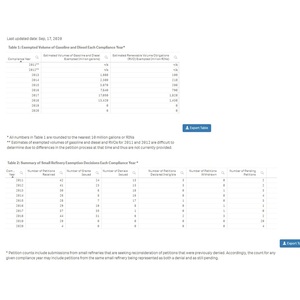EPA: 7 new SRE petitions filed, including 5 gap year SREs

September 17, 2020
BY Erin Krueger
The U.S. EPA on Sept. 17 published updated small refinery exemption (SRE) data that reflects the denial of 54 gap year SRE petitions announced by the agency on Sept. 14. The data also shows seven new SRE petitions have been filed in recent weeks, including five new gap year SREs.
One new gap year SRE was filed for each compliance year 2011 through 2015. There are now 17 gap year SRE petitions pending, including two SRE petitions filed for compliance year 2011, two SRE petitions filed for compliance year 2012, three SRE petitions filed for compliance year 2013, four SRE petitions filed for compliance year 2014, three SRE petitions filed for compliance year 2015, one SRE petition filed for compliance year 2016 and two SREs filed for compliance year 2018.
The gap year SRE petitions were filed by small refineries in an effort to circumvent a January 2020 ruling by Tenth Circuit Court of Appeals that determined the agency cannot extend SREs to any small refinery whose earlier, temporary exemptions had lapsed. Information released by the EPA on Sept. 14 seems to indicate the agency will deny the remaining gap year SREs once required analysis is complete.
Advertisement
Since the agency last updated its SRE data on Aug. 20, small refiners have also filed one additional SRE petition for compliance year 2019 and one for compliance year 2020. As of Sept. 17, EPA data shows a total of 29 SRE petitions have been filed for compliance year 2019 and four have been field for compliance year 2020. All 2019 and 2020 SRE petitions are still pending.
Additional SRE data is available on the EPA website.
Advertisement
Related Stories
CountryMark on July 22 celebrated the completion of more than $100 million in upgrades at its refinery in Indiana, including those related to soybean oil storage. The facility produces renewable diesel via coprocessing technology.
ATOBA Energy and Air Moana are partnering to implement scalable solutions for the supply of SAF. The collaboration aims to ensure long-term SAF availability while supporting local initiatives to develop sustainable fuel production in Tahiti.
While final IRS guidance is still pending, the foundation of the 45Z program is well defined. Clean fuel producers should no longer be waiting; they can now move forward with critical planning and preparation, according to EcoEngineers.
Neste Corp. on July 24 released second quarter results, reporting record quarterly renewable product sales volumes despite weaker margins. SAF sales were up nearly 80% when compared to the first quarter of 2025.
Valero Energy Corp. on July 24 released second quarter results, reporting a profitable three-month period for its ethanol segment. The renewable diesel segment posted a loss, but the company’s new sustainable aviation fuel (SAF) unit operated well.
Upcoming Events










